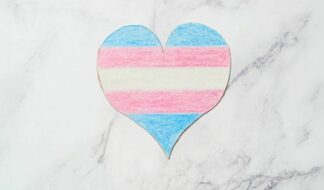By Tara Cavanaugh
Talking to Kris S. – the name he prefers to be printed – is like talking in code. He's serving in the National Guard, but he can't say where, just that he's in the Middle East for Operation Enduring Freedom. Over spotty cell phone service, he talks to BTL about the repeal of "Don't Ask, Don't Tell," the military's ban on openly gay service, but he can't say the word gay. Kris is not out.
Through all the code speak, one thing is clear: DADT repeal doesn't mean much for this closeted service member.
DADT repeal is hailed as a great advancement for the LGBT community. Originally signed into law by President Bill Clinton in 1996, it prohibited gays and lesbians from serving openly. Men and women who outed themselves when applying for service could be turned away, and those who were outed when serving could be discharged.
"Today's achievement is a tribute to all the patriots who fought and marched for change; to Members of Congress, from both parties, who voted for repeal; to our civilian and military leaders who ensured a smooth transition; and to the professionalism of our men and women in uniform who showed that they were ready to move forward together, as one team, to meet the missions we ask of them," said President Barack Obama in a statement Tuesday.
President Barack Obama signed DADT repeal into law last December, with the condition that the repeal wouldn't go into effect until the military signaled its readiness, which it did late this summer. The idea was to make sure that service members had enough training before DADT was officially off the books.
Kris's training was a 4-hour Power Point presentation that covered the new rules of repeal, and not much else.
"They talked about the new regulations, the new laws, sharing quarters, things like that," Kris said. "It's basically still 'Don't Ask, Don't Tell.' But (now) it's 'Don't Ask, Don't Tell, Don't Care.'
"Other services like the Navy, Air Force, even Marines, actually had better training than we did. Our training sucked."
What's it like on the ground, with his peers? What's their attitude toward DADT repeal?
"A lot of people do care about it, but a lot of people don't want to say anything about it," Kris said. "It's like going to your grandma's house for Sunday dinner. There's something you need to talk about, but no one wants to talk about it, so we all talk around it."
Kris doesn't worry about being outed, because he keeps his personal life separate from military life. If he were outed, only a select few would be bothered. Unfortunately, the ones most likely to be bothered are his superiors.
"The older generation is still the same," he said. "The newer generation is totally different. We grew up with it." Kris has especially seen a change in attitudes among his peers in his four total years of service.
Kris later writes to BTL in an email, where he feels he can be more open and descriptive: "Since it is the older generation that makes the decisions for now, many of the LGB service members that I have talked to want no one to actually know about them."
The military hasn't done enough to prevent acts of retaliation, he writes. "They have not created any new programs in units that have a high prejudice rate. They have just said, 'We know you're gay, but we don't want to deal with it. No, we won't give you money or insurance for your spouse. No, we will not honor those commitments that your spouse is entitled to when you die.'
"All they have done is say, 'You're in.' But now what?"
The hurdles regarding benefits that Kris describes result from the Defense of Marriage Act. Because of DOMA, which defines marriage as only between a man and a woman for federal purposes, the federal government does not have to recognize same-sex marriages or partnerships. The act prohibits the military from giving same-sex partner benefits.
With the everyday stresses of being an active member, and the additional work of keeping part of himself hidden, Kris needs a strong support network.
"I have good friends at home, but one of the things about being here is that you tend to lose communication with a lot of your friends because you're not there," he said. "So I have a support network, but every time I go on active duty orders, they more or less become inactive."
He knows he can call a select few confidants, but he prefers to tough it out first, only calling if he really needs to. When he does call, he talks to Barb Murray, the executive director at AIDS Partnership Michigan, where he's worked as an HIV testing counselor. Or he might call a friend from the REC Boyz, a group he's been active in.
Social media helps a lot, Kris writes in an email.
"I thank my faith that I came up in a technological era," he writes. "Social media has become the unspoken way of the gay in the military. Just like everything else, we keep these groups top secret, so that we can just be ourselves and let our hats off without reprisal from outside prejudices. We have created our own sites, blogs and even social media events that to the common eye would look like a military hangout."
What does Kris look forward to most, when he returns home next March?
"Going to school and graduating," the 22-year-old said. "I joined the military to (pay for) school, but I haven't had the opportunity to do it full time. Another thing I'm looking forward to is just being able to relax. Being able to be myself. Being able to call people when I want to call them, being able to talk about what I want to talk about, and never talking in between the lines."
There's no trace of sadness or whine in Kris's voice. He's a young man who's there to fulfill a duty – nothing more, nothing less.
"I learned this on this deployment: if you let everything bother you, you defeat your purpose of trying to get something accomplished. You'll never get anything accomplished because something's always keeping you upset, something's always keeping you down. That's the one thing I've been taught by the military: I can overcome anything, as long as I have faith in myself.
"If you didn't have a backbone when you joined the military, you will have one after you leave it. That's one thing they do instill in you."









